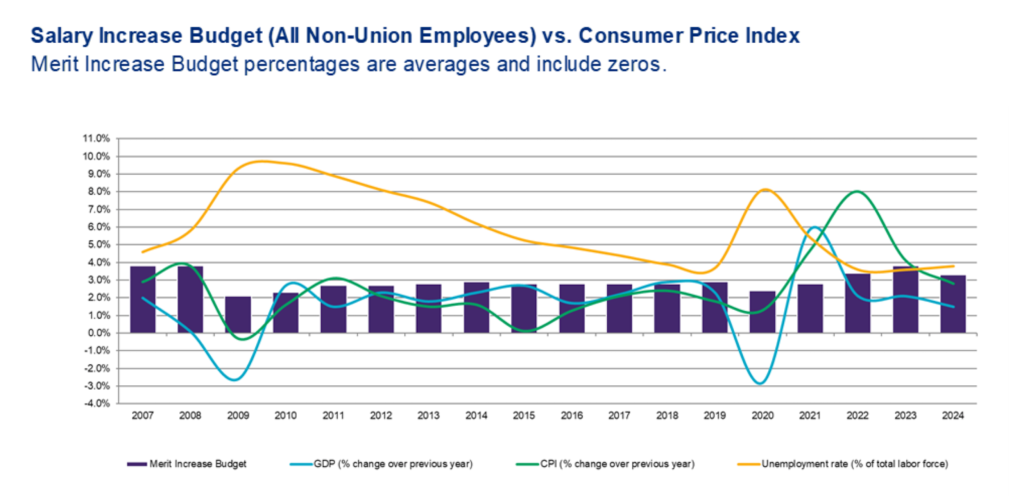Tighter budgets mean fewer raises and promotions. But taking ‘your foot off the gas when it comes to compensation’ may backfire
Good morning. Many companies, for a variety of reasons, haven't stuck to their projected salary budgets for 2024.
According to Mercer’s March 2024 U.S. Compensation Planning survey, on average, employers raised compensation budgets by 3.3% for merit increases and 3.6% for total salary increases for non-unionized employees—both figures coming in lower than November projections of 3.5% and 3.8%, respectively.
The firm's analysis is based on data from more than 1,000 U.S. organizations across 15 industries, ranging from those with fewer than 500 employees to some with over 20,000. While some industries did see higher-than-average figures for merit increases budgets—the highest, transportation equipment, came in at 3.9%—others, such as health care services, were well below at 2.9%.
Potential increases keep trending downward, according to Michael Citron, principal, compensation and rewards consultant at Mercer. Companies also have been pulling back on promotions.
“Back in November, they said, ‘Okay, well, on average, we think we're going to promote 9.3% of our employees,’” Citron explained. “And then when we ask again in March, they're saying, ‘Okay, well, maybe it's 8%.’”
The “why” for pulling back on promotions isn’t covered in Mercer’s report, but “what we're hearing in conversations with our clients is just general economic uncertainty,” Citron told Fortune.

In the face of high interest rates, a report released on Thursday by the Commerce Department said U.S GDP decelerated in the January-to-March quarter to a 1.6% annual pace from 3.4% in the final three months of 2023. (But consumers, the main driver of economic growth, kept spending at a solid pace.)
It’s too soon to tell if this will have an effect on pay increase projections for 2025, Citron said, but even in the current economic climated, he offered this advice to executives: “Don't completely think that you can take your foot off the gas when it comes to compensation.”
There’s still competition for talent, and some companies are starting to realize that, with off-cycle raises—additional compensation not directly tied to an annual review—rising 10% since in November.
“What we're hearing a lot from our clients is, ‘We actually need to make sure that our pay is market aligned,’” Citron said, adding that more companies are beginning to realize that “compensation is just one part of a bigger pie.” Attracting, retaining, and motivating employees also includes a broader total rewards strategy—benefits, career mobility, flexibility, and a sense of purpose.
“If they really listen to their employees and understand what the market looks like for those total rewards," Citron added, "then they may be able to craft a strategy and figure out how to invest in different areas in a way that could, for them, actually be cost neutral."
Have a good weekend.
Sheryl Estrada
sheryl.estrada@fortune.com
María Soledad Davila Calero curated the Leaderboard and Overheard sections of today’s newsletter.
This story was originally featured on Fortune.com
